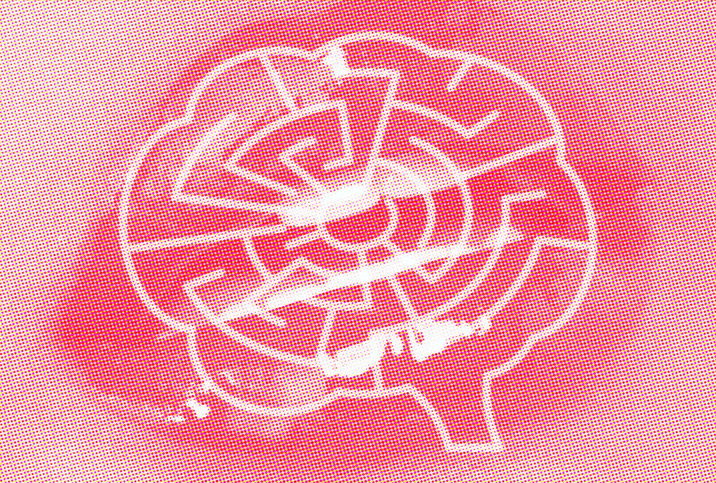WTF Is Orgasm Anxiety?

Sex isn't necessarily simple. In fact, it rarely is. We know some people, especially women, struggle to reach orgasm. In a study published in 2017 in the Archives of Sexual Behavior, 95 percent of straight men reported they "always" or "usually" orgasm during sex, while only 65 percent of straight women reported the same. About 10 percent to 15 percent of women claim to have never reached orgasm.
There are a number of reasons you may find orgasming difficult. It could be a case of low libido, an ill-informed partner, a lack of communication or problems in the relationship. However, you may not have realized it's possible to develop a condition known as orgasm anxiety, which can make achieving orgasm feel impossible.
What is orgasm anxiety, anyway?
"Orgasm anxiety happens when [a person] struggles to reach orgasm or faces anxiety and overthinks during sex," said Maria Allgaier, CEO of Freyja XO, a social media network based in Finland that specifically focuses on improving sex education and making pornography safe and sustainable. "This usually happens during partnered sex. It can mean something slightly different or lead to a different reaction and a different physical or mental response depending on the person."
Of course, it's normal for the mind to stray every now and then—even during the heat of the moment.
"Intrusive thoughts can happen during sex and masturbation, and this can be normal," explained Ness Cooper, a clinical sexologist and sex therapist in the United Kingdom. "The brain is pretty random and won't always shut off completely to focus on just sexual pleasure. There's no shame in your brain thinking of other things during sex, just like when you're doing nonerotic things there's no shame to wander into fantasy."
'The brain is pretty random and won't always shut off completely to focus on just sexual pleasure.'
However, when you consistently find your mind straying and it becomes difficult to reach orgasm as a result, you may be dealing with orgasm anxiety.
For some people, orgasm anxiety can manifest as a fear of reaching orgasm.
"I realized that no matter how much I crave it, at the end of the day, I'm scared of pleasure," one woman explained in an article in the Swaddle, a digital magazine based in India. "I've hardly ever orgasmed, even with myself, because I just get too scared close to the climax. Of what? I don't know…I genuinely feel it's going to be so good that I'll pass out and won't be able to take it."
For others, orgasm anxiety may manifest in:
- Physical tensing during intercourse
- A busy, wandering mind
- A sense of dread or nervousness
- A feeling of awkwardness or hyperawareness of your body during sex
What causes orgasm anxiety?
Orgasm anxiety can develop as a result of a wide variety of factors. These can include:
- Anxiety, stress or depression in your everyday life
- No access to good sex education
- Sexual trauma
- Shame of sex
- Judgment or anxiety about your performance
- Unrealistic expectations
- Body image issues
"Most of us have not had a good sex education, and so [we] have learnt about sex from pornography," Allgaier said. "Now, this is not to say that all pornography is bad, but a lot of pornography is not specifically made for education; it is made for entertainment. Nevertheless, young people are using this as education and internalizing the material they see."
Using pornography can lead to unrealistic expectations, body image issues and dissociation from your body.
"We have seen an increasing number of people with vulvas facing anxiety to 'act like a porn star' and to 'orgasm like a porn star,' and in turn, this can lead to some people having orgasm anxiety, or may make one feel the need to fake it, to the point where they struggle to orgasm in partnered sex," Allgaier said. "In addition, we are seeing a number of people with penises who have performance anxiety, specifically, around orgasming."
Allgaier added: "There needs to be more educational context around pornography, and schools and parents need to start having more talks with their teens. Everyone needs to play their part, be it the consumer, parents, schools, governments, adult companies and performers."
How to deal with orgasm anxiety
Orgasm anxiety can be disheartening and downright annoying for you and your sexual partners. Unfortunately, it isn't typically a condition that goes away by itself.
"When it comes to dealing with orgasm anxiety, you should definitely speak to a sex therapist if necessary," Allgaier suggested. "However, some people have found spending more time exploring their own body, masturbating and finding out what they like has helped to reconnect and reduce this anxiety."
Learning to communicate openly and honestly with your partner about what you are experiencing is also important. Allgaier added that becoming more conscious about how you consume sexual content, such as pornography, can prove helpful.
"Think about where and what type of pornography you are consuming, and always try to add in some educational content or context with the entertainment," she noted.
Learning to communicate openly and honestly with your partner about what you are experiencing is important.
"Learning that orgasm doesn't have to be a goal to reach can be very liberating for individuals," Cooper added. "Some therapists prescribe nonorgasm-focused touch to couples for a period of time, so the couples can learn other methods of pleasure they each enjoy and enjoy together."
For people who feel a lot of physical tension in the lead-up to orgasm, Cooper said a pelvic floor specialist can help.
"Muscle tension in the pelvic area can make it harder to orgasm," she said. "This isn't always linked to just a mental block."
In cases of sexual trauma, a psychosexual therapist may be the answer.
"This can be a helpful step as your experience of this will be unique to you and they are the most trained to help in a variety of ways," Cooper noted.
Finally, examining your relationship to shame and sex can also help.
"Exploring cultural or generational shame around sex and sexual pleasure can be useful for some individuals [to explain] why they may have reoccurring anxieties related to orgasm and sexual pleasure," Cooper said. "Breaking down the shame and stigma can be hard for some individuals, so getting support from a sex and relationship therapist can be good."


















